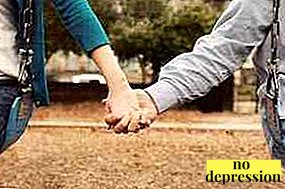Fear of the child is called cocoa psychological constipation. The pathological condition is eliminated in several ways, but if there are some reasons for its occurrence, it will not be possible to do without the help of a psychologist.
Psychological constipation should not only be treated, but also prevented in a timely manner. One of the most common reasons that a child is afraid of cocoa is considered pot potting.
Fear of bowel movement may occur in the background medical factors. To cope with this problem is easier if you start the fight from the moment the first symptoms of fear appear in the child.
How often does this problem occur?
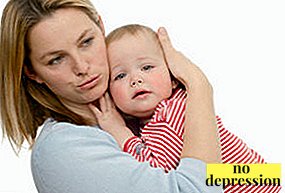
Psychological constipation is one of the common problems in pediatrics.
It can be provoked by numerous factors, including unhealthy diet, as well as parents' mistakes in teaching a child to elementary procedures.
The prevalence of a specific phobia is closely related to the increased incidence of diagnosing problems with the digestive system in children.
Once transferred, constipation can cause serious psycho-emotional upheaval in a baby.
Features of the problem:
- fear of bowel movement may occur in a child, regardless of age;
- at risk are children under two years of age (the main reason is improper potty training or related diseases of the digestive system).
How can fear be manifested?
The main factor indicating the presence of a child's fear of going to the toilet, is the occurrence of the baby negative reaction if necessary, emptying the intestines.
This condition may be accompanied by a categorical refusal from the pot, whims and weeping, shouts and tantrums.
 The baby does not react to the persuasion of parents.
The baby does not react to the persuasion of parents.
TO main symptoms psychological constipation may be joined by additional signs, such as tremor of the extremities, pallor of the skin, and factors indicating fear.
Why does fear arise?
Causes of a child’s fear of bothering or writing in most cases relate to psychological factors. Some babies refuse to empty their intestines as a protest.
Such a situation may arise, for example, when improperly trained to the pot.
If the child had constipation, then the fear of kakak will also be triggered by a violation of the psycho-emotional state. The baby will be afraid to empty the intestines, waiting for repeated pain.
Possible causes The following factors can be the cause of the development of the fear of cacao:
- suffered constipation, accompanied by severe pain;
- diseases of the digestive system, accompanied by pain during defecation;
- improper methods of raising and teaching a child to the pot;
- fear of the process of defecation (the child is afraid of the process of release of feces);
- errors in the choice of the pot (the object is too bright or has other features that frighten the baby);
- shyness as a character trait (the child is not comfortable emptying the intestines in the presence of other people);
- excessive penalties from adults for wet pants.
What if the child refuses to crap? Doctor's advice Komarovsky:
What is dangerous in restraining intestinal urge?

Intentional restraint of intestinal urges may provoke serious pathological processes in the child's body.
The accumulation of feces violates the process of digestion, causes abdominal distention and excessive gas formation.
Getting rid of some complications will be accompanied by a long course of treatment, and constipation can acquire chronic form.
The consequences the absence of timely bowel movement may be the following complications:
- from the accumulated fecal masses harmful substances will come to an organism;
- development of inflammatory processes in the intestine;
- cracking of the rectum;
- violation of the process of restraint of feces (fecal incontinence);
- disruptions in the metabolic processes of the body;
- prolapse of the mucous membranes of the colon;
- a change in the normal state of the intestinal microflora;
- decrease in local immunity.
How to eliminate medical causes?
If constipation gives the child significant discomfort and occurs regularly, then you need to undergo a comprehensive examination and identify the cause of the violation bowel emptying process.
 The factors provoking this condition may be the features of the age category, diseases of the digestive organs or errors in nutrition.
The factors provoking this condition may be the features of the age category, diseases of the digestive organs or errors in nutrition.
Doctor selects the best options to eliminate such problems, and prescribe treatment.
If constipation does not appear regularly or are a consequence of clarified pathologies, then you can use several recommendations to prevent pain in the baby.
Options for resolving medical problemsprovoking constipation in a child:
- normalization of the diet (inclusion of foods rich in vitamins in the children's menu);
- products that have the ability to eliminate constipation are prunes and kiwi;
- taking probiotics and prebiotics (means normalize the intestinal microflora and prevent constipation);
- Teaching your baby to eat kefir at bedtime (for young children, you can use lactic acid mixtures);
- hot water bottle on the tummy (this procedure is used to eliminate colic in babies and abdominal distention, the method is also effective for constipation);
- sea buckthorn candles (the remedy quickly heals wounds and softens fecal masses);
- compliance with the drinking regime (if the child wants to drink, then he can not refuse).
How to help your child avoid recurring pain after constipation?
Fear of bowel movements after constipation, is a natural reaction of the child’s body. Especially if the pain was sharp and brought considerable torment to the baby.
 To prevent pain, you can use the tools that facilitate bowel movement and change the consistency of the stool.
To prevent pain, you can use the tools that facilitate bowel movement and change the consistency of the stool.
Additionally, you should follow the recommendations of the doctor and carry out a full treatment of the pathology that provoked the problem.
Options prevent pain defecation:
- laxative candles (glycerin candles are recommended for children);
- enemas (option is not always suitable, the procedure may even more scare the child);
- massage (bowel emptying will be easier if you regularly stroke the baby’s tummy);
- dill water (folk remedy is allowed for use by pediatricians and is widely used in pediatrics);
- preparations for the normalization of the intestinal microflora and improve the process of defecation (Linex, Plantex, Bifidumbakterin).
The kid is afraid of the pot
An integral part of the potty's schooling is creating the most comfortable psychological conditions for the baby. Negative impact on the child's psyche must be excluded.
It is important not only not to shout at the child if he is afraid of the pot, but also not to expose him to other stressful situations.
The main reasons for this fear are errors in education and improper hygiene item.
Options to combat the fear of a child in front of the pot:
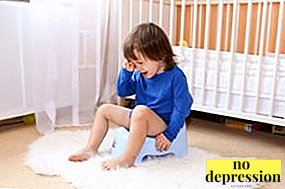 If the child does not like the pot, then it needs to be changed (perhaps, another color or shape will reduce the feeling of fear and cause the interest of the baby).
If the child does not like the pot, then it needs to be changed (perhaps, another color or shape will reduce the feeling of fear and cause the interest of the baby).- Not worth it force child to use the pot (if the process of schooling will be accompanied by stress, then it will be extremely difficult to cope with the problem).
- The child may be afraid to use the pot. aloneIn this case, you can try to be near or hold his hand.
- A good result can be achieved if invite guests a child who uses a pot (by the example of his peer, the baby will be easier to cope with fear).
- Before using the pot for the first time, an unfamiliar object is necessary. put in toys (the child must first learn it, but do it yourself).
- The process of defecation in children can occur out of controlif the child is busy with something (after dropping the baby on the pot, you can give him a favorite toy, plasticine, or a cartoon).
- You can play with the baby in a game in which all of his favorite toys they will take turns using his pot (at the end of the game the child will have to repeat the procedure).
What to do if the child refused to go to the toilet on the pot:
Wrong toilet training

Schooling the child to the pot should be not only right but timely.
Experts recommend starting school with one and a half years.
If you try to get your kid to use the pot at an earlier age, the mistakes of parents can cause psychological trauma in the child. Aggressive emphasis must be completely excluded.
Common mistakes parents:
- punishment for refusing to use the pot;
- screaming at the baby for fear of defecation;
- creating stressful situations for the baby;
- humiliation of the child if he has a fear of defecation;
- ignoring the fear of the child after suffering constipation;
- too early to teach the child to the pot.
Doctor Komarovsky about how to teach a child to the pot:
The child is afraid to go big in kindergarten or school
If there is a fear of defecation in a child attending a kindergarten or school, it is necessary to take into account the fact of his schooling for this procedure.
If the baby goes to the toilet at home alone, then it is important to find out the reason his fear out of the house (unpleasant smells, frightening atmosphere, shyness).
About the delicate problem should definitely tell the tutor or teacher. The teacher will be able to choose the psychological ways to eliminate fear.
Solutions to the problem:
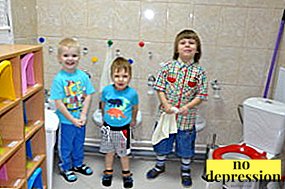 If you bring a child's personal pot to the kindergarten, it will be easier for him to get used to the toilet.
If you bring a child's personal pot to the kindergarten, it will be easier for him to get used to the toilet.- Before breakfast, the baby should be offered water (the process of defecation can occur at home before going to the kindergarten).
- If a child is afraid to go to the toilet in the company of other children, then the caregiver should be asked to let go of the baby alone or help him if necessary.
- From an early age, the baby should be taught hygiene after a bowel movement (the child’s fear may be caused by the need to ask the caregiver or teacher for help).
- You should definitely talk with your child about the problem and try to find out the cause of his fear (based on the information received, it will be easier to find a way to deal with fear).
What if the child does not go to the toilet in kindergarten? Tips:
How to overcome fear?
Experts recommend parents pay special attention to the atmospherein which the child is brought up. Fear of bowel movement in most cases is triggered by psychological or physiological factors.
In the first case, parents can quarrel and constant reproaches of the baby can provoke fear.
Physiological causes are due to pathological processes in the child’s body. When eliminating the causes of psychological constipation adults action algorithm is not different.
Recommendations psychologists to overcome the fear of crap in children:
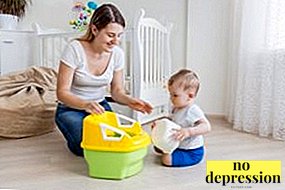 Do not focus attention baby on the problem (do not too often be interested in him, whether he went to the toilet or whether you want to crap).
Do not focus attention baby on the problem (do not too often be interested in him, whether he went to the toilet or whether you want to crap).- Good performance in eliminating psychological constipation playing methods (you can invent a fairy tale, imagine that your favorite toy has constipation, etc.).
- You can not shout and punish a child if he is afraid to go to the toilet (parents must provide the child with maximum moral support).
- Can not humiliate child and have a negative impact on his self-esteem (for example, to reproach that someone from the familiar children uses the pot, to criticize or tease the baby).
- Some children refuse to pot because interest in the toilet (for a baby, you need to buy a special pad and offer him to use an adult toilet, identifying such a factor will greatly facilitate the visit to kindergarten and school)
- With older children you can spend learning conversations on the importance of timely defecation for the body (it is not necessary to give examples of too dangerous consequences).
Disruption of the bowel movement can cause serious health consequences for the child.
Fear of poking will be accompanied not only by psycho-emotional disorders, but also by a malfunction of the digestive organs.
You can fix some problems only surgically. Treatment of fear of defecation in children should begin from the moment of the first signs of this condition.
A psychologist about why a child refuses to go large in a pot:

 If the child does not like the pot, then it needs to be changed (perhaps, another color or shape will reduce the feeling of fear and cause the interest of the baby).
If the child does not like the pot, then it needs to be changed (perhaps, another color or shape will reduce the feeling of fear and cause the interest of the baby). If you bring a child's personal pot to the kindergarten, it will be easier for him to get used to the toilet.
If you bring a child's personal pot to the kindergarten, it will be easier for him to get used to the toilet. Do not focus attention baby on the problem (do not too often be interested in him, whether he went to the toilet or whether you want to crap).
Do not focus attention baby on the problem (do not too often be interested in him, whether he went to the toilet or whether you want to crap).

